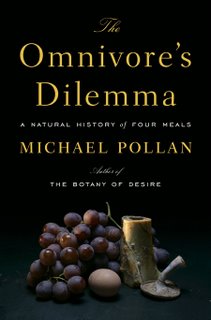
I’ve just been reading in Salon about a fascinating new book called The Omnivore's Dilemma by Michael Pollan. Americans have not only lost the connection between the land and what they eat; this is a country which doesn't really cook at home anymore. I was shocked when an NPR story on how to make your own salad dressing became one of the most-emailed stories of the week! Is it frightening that Americans don’t know how to make salad dressing from scratch, or gratifying that they want to learn?
Pollan had a New York Times Magazine cover story recently about hunting boar, with a little unease, in order to connect to his place in the food chain, and because he “wanted, for once in [his] life, to pay the full karmic price of a meal.” I don’t enjoy reading about the slaughter of animals, but as a meat-eater I can’t very well turn my eyes from the killing that precedes my meals. A good reminder of the the true cost of food.
The Omnivore's Dilemma is also about how corporate America drives the nation’s obesity epidemic with high-fructose corn syrup, why Americans should spend more on fresh food instead of junk, and what’s really at stake when we decide what to put into our mouths.
Which brings me to something Ari Weinzweig told the Fellows at lunch at Zingerman’s Roadhouse yesterday. He says if you eat great food you’ll find it tastes better than “industrial food”, and because you get more pleasure from it your tastes are satisfied sooner. You need less to provide the sensations and you don’t need to overeat to remove the bad aftertaste of factory-made food. Which probably explains why Ari is so slim.
No comments:
Post a Comment